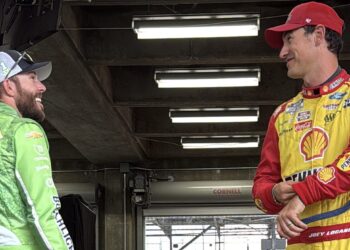When Michael Jordan made his high-profile leap into NASCAR as co-owner of 23XI Racing, he didn’t just add a new layer of star power to the sport — he reshaped the conversation around its future. The NBA icon’s partnership with Denny Hamlin to create 23XI Racing promised to bring fresh sponsorships, new fans, and a progressive vision to a sport steeped in tradition. Since its debut in 2021, the team has made headlines for its ambition, big-name drivers like Bubba Wallace and Tyler Reddick, and competitive flashes on the track.
Yet despite the buzz and commercial success, not everyone in the NASCAR garage is fully convinced that 23XI is on a steady path to long-term success. This week, NASCAR Hall of Famer Richard Petty, known as “The King” and a voice respected across generations of drivers, spoke candidly about a major concern he has with Jordan’s team — and it’s something deeper than lap times and checkered flags.
In a recent interview, Petty highlighted what he sees as a worrying trend in modern NASCAR: big-name ownership groups relying too heavily on celebrity appeal and sponsorship dollars without laying a solid foundation of racing culture and grassroots strength. While he praised Jordan for bringing mainstream attention to the sport, Petty warned that NASCAR teams must be built on racing DNA first — and that’s where he thinks 23XI might face a reckoning in the coming years.
“The thing with 23XI is, they’re doing a lot of good things — they’ve got good drivers, good equipment, and they’re competitive on their day,” Petty said. “But racing is about more than just having money and a big name behind you. You’ve got to build a culture, a tradition, a core. Right now, I just don’t see that same foundation that the old teams had.”
Petty’s concern is not purely sentimental. He pointed to the history of powerhouse teams like Hendrick Motorsports and Joe Gibbs Racing — dynasties built over decades, with deep roots in NASCAR’s development series, a pipeline of young talent, and loyal crews who live and breathe stock car racing. In Petty’s view, 23XI is still figuring out how to blend its corporate sheen with the gritty, blue-collar heart that has always driven NASCAR success.
At the core of this tension is the rapid commercialization of the sport in the modern era. Jordan’s star power has certainly brought lucrative sponsors like McDonald’s, DoorDash, and Dr Pepper on board — deals that smaller, family-run teams can only dream of. But Petty argues that if the culture inside the team doesn’t match the money outside of it, cracks can appear when times get tough.
“We’ve seen teams with big budgets come and go,” Petty said. “It’s what happens when you don’t build something deeper. You need people who’d work on those cars all night, drive the haulers cross-country, do whatever it takes because they love it, not because it’s flashy.”
There’s also the question of performance. While Bubba Wallace has delivered moments of brilliance — including his historic win at Talladega and a playoff appearance — consistency remains elusive. Tyler Reddick, seen as one of NASCAR’s most talented young drivers, has brought speed to the No. 45 car but is still searching for sustained momentum. Critics argue that without a deeper bench of developmental drivers and a tighter pipeline to nurture future stars, 23XI risks being a revolving door of talent rather than a breeding ground for champions.
To be fair, Jordan and Hamlin are not ignoring these challenges. Hamlin, a veteran racer with Joe Gibbs Racing, understands the traditional NASCAR model as well as anyone, and insiders say he has been working to instill that same culture in 23XI’s shop. The team has invested in top-tier crew chiefs, state-of-the-art facilities, and a growing alliance with Toyota, hoping to strengthen its competitive backbone.
Still, the balance between corporate polish and racing grit is tricky. Jordan’s presence will always bring a layer of celebrity and big-brand marketing. But as Petty’s warning implies, the real test will come when the hype fades and 23XI must stand on its racing merit alone.
For NASCAR as a whole, the conversation sparked by Petty’s comments is timely. The sport is at a crossroads — trying to keep its loyal base while attracting new fans in an era of streaming, social media, and star-driven branding. Teams like 23XI represent a bold experiment: can NASCAR’s rough-and-tumble roots coexist with a new wave of high-profile owners, slick sponsors, and global appeal?
Petty hopes they can — but he insists they must not forget where the sport came from. “At the end of the day,” he said, “it’s still about racing. You build from the ground up. If you don’t have that, all the money and fame in the world won’t keep you running up front.”
Whether 23XI can prove The King wrong will be one of the sport’s most fascinating stories to
watch in the years ahead.











